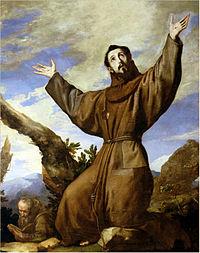It seems odd that some 800 years after his death, people are still writing books about St. Francis of Assisi (1182-1226). It appears, however, that thousands of previous efforts to render and claim him haven’t been sufficient, so we have two more. It also seems odd that the New Yorker would review them. Oddities aside, Francis seems to have intuited that property, money, and storage were game changers in the course of human history:
At this point, in the words of Francis’s “Testament,” “God gave me brothers.” In 1206, the year that he renounced his inheritance, two young Assisians joined him. By 1208, the group numbered twelve. The Franciscan movement had begun. In Francis’s view, property, by arousing envy and, therefore, conflict, was the one thing most destructive to peace in the world. Thus the community lived, as completely as possible, without property. To be part of the group, a man had to sell all his goods, give the money to the poor, and, like Francis, sever all ties with his family. Francis’s followers dressed the way he did—dirty tunic, no shoes. Their home was a wretched little shack outside the town. When the owner decided he wanted to house his donkey there, they were kicked out. Then, in a district called the Portiuncula, they found a ruined church, Santa Maria degli Angeli, and they built wattle-and-daub cells around it. This remained their headquarters for the rest of Francis’s life.
By day, the brothers did the kinds of work that Francis felt were sanctioned by the Gospel. They renovated churches, tended to lepers, performed manual labor for farmers and artisans, preached, and prayed. They could accept a payment of bread and fruit for their labor, but they were not allowed to have money. Nor could they, in any way, save up for the next day. They could not own any dwelling they lived in. (They rented the church in the Portiuncula from a local abbot.) They could not store up food. They couldn’t soak vegetables overnight.
In addition to whatever else he might have been, Francis had a keen understanding of anthropology (and political economy). He clearly divined that among the many profound effects of the Neolithic transition, the most socially disruptive revolved around food production and storage. These set in motion a cascading series of events (surplus, specialization, and stratification) that lead eventually to property, money, and power. It’s too bad Francis never found a home among foragers.


